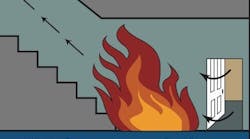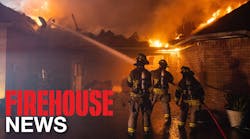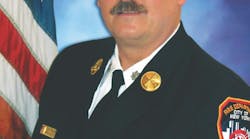The fire-rescue service always has been aware that America would be the target of a catastrophic terrorist attack and firefighters would be among the casualties. But no one could foresee a disaster of the magnitude that struck the World Trade Center and the Pentagon on Sept. 11. As always, firefighters were the first to respond and showed the world the true meaning of courage and devotion to duty.
As this is written, we don't know how many New York firefighters and EMS personnel died in the line of duty in this disaster, but it is the greatest loss in the history of the FDNY and the American fire service. And, we must also honor the police officers who were killed when the twin towers collapsed. Fortunately, no firefighters were lost at the Pentagon, but many risked their lives to rescue survivors and prevent the fire from spreading.
In the years following Oklahoma City and the first World Trade Center bombings, fire departments across the country did what they could to prepare for terrorist attacks. This was especially true around New York and Washington, where there are so many symbolic targets. But there has been a critical shortage of resources and widespread dissatisfaction with the fragmented and uncoordinated approach of the federal government. The Clinton administration and the U.S. Senate rejected the idea of a Cabinet-level office to coordinate and lead the nation's anti-terrorism defense. Some high-ranking officials seemed unable to comprehend that local fire departments are the only agencies that can save lives while there's still time to save them. Maybe now they will understand what "first responder" really means.
The great fear among fire officers dealing with the threat of terrorism was a chemical or biological attack that would inflict heavy casualties on the first-responding units and create tremendous rescue and EMS problems. That's where our attention was focused. In all of the planning sessions and training drills, no one ever brought up the scenario of kamikaze pilots crashing hijacked airliners into buildings filled with thousands of people. It appears that those in authority who should have known underestimated the enemy's fanaticism, cunning and capabilities.
The warning signs were there, starting with the suicide bombers in Israel. The attacks on American military housing in Saudi Arabia, a destroyer in Yemen harbor and the U.S. embassies in East Africa clearly showed that these terrorists were well organized and well-financed, had a safe place to hide and a voracious thirst for American blood. It was only a matter of time before they would strike at targets in this country that would produce a massive loss of life. But no one imagined they could simultaneously hijack four domestic airliners and launch precisely timed attacks on targets in two cities. It raises at least two critical questions:
- With so many people involved in the planning, support and execution of this plot, why didn't U.S. intelligence and law enforcement agencies pick up their tracks?
- How were they able to breach security at three different airports? Why were the knives and cardboard cutters they apparently used as weapons not discovered?
Once the killers slipped through the airport checkpoints, the passengers and crews on the planes, the people in the buildings and the firefighters in their New York firehouses were all doomed. When those fire companies responded to the World Trade Center, their apparatus filled the canyon-like streets of lower Manhattan and they had to go inside the burning towers to rescue trapped people and fight the fires. There was no alternative; it was their job.
There also was no previous experience with a large jet airliner crashing into a modern high-rise building. It had never happened before. Back in 1945, an Army plane accidentally struck the Empire State Building, but that solid-concrete structure had withstood the impact and the fire it produced. In contrast, the World Trade towers were steel and glass, and the huge planes were loaded with jet fuel. The impact, explosion and fires were unlike anything anyone had ever seen. The FDNY's chiefs are the world's most experienced when it comes to high-rise fires, but no one had ever heard of a skyscraper collapsing because there never had been a fire like this.
In Arlington, VA, firefighters faced a different set of dangers and challenges, but unlike New York, the type of building and its location were on their side. The Pentagon is a concrete, compartmentalized, low-rise structure that squats by itself in a wide open area surrounded by parking lots. The crash left a gaping, wreckage-filled hole and spread intense fire to either side. But most of the building suffered only smoke damage and was safely evacuated. However, there were difficult and dangerous problems at and around the point of impact. The Arlington County Fire Department - with mutual aid from the District of Columbia and suburban departments in northern Virginia and Maryland - did a superb job of knocking down fire on either side of the collapse zone. (I responded with a rehab unit of the Friendship Fire Association and was impressed with what I saw of the fire-rescue operations.)
In Arlington and New York, firefighters and EMS personnel did everything they were supposed to do - and more. The fire service has every reason to be proud of them. But our pride is tempered with terrible sadness because of the price that was paid in New York. We never have experienced a tragedy of this dimension and in our grief cannot help but wonder, "What could have been done differently?"
I've asked that question a hundred times since Sept. 11 and I keep coming back to the same answers. It would not have happened if our intelligence and law enforcement agencies had learned of the plot and taken action. And, it could have been stopped at the last minute if the terrorists had been detected by airport security. At this point, I don't know of any other way the lives of thousands of innocent people and hundreds of brave firefighters could have been saved.
Hal Bruno, a Firehouse® contributing editor, retired as political director for ABC News in Washington and served almost 40 years as a volunteer firefighter. He is a director of the Chevy Chase, MD, Fire Department and chairman of the National Fallen Firefighters Foundation.





